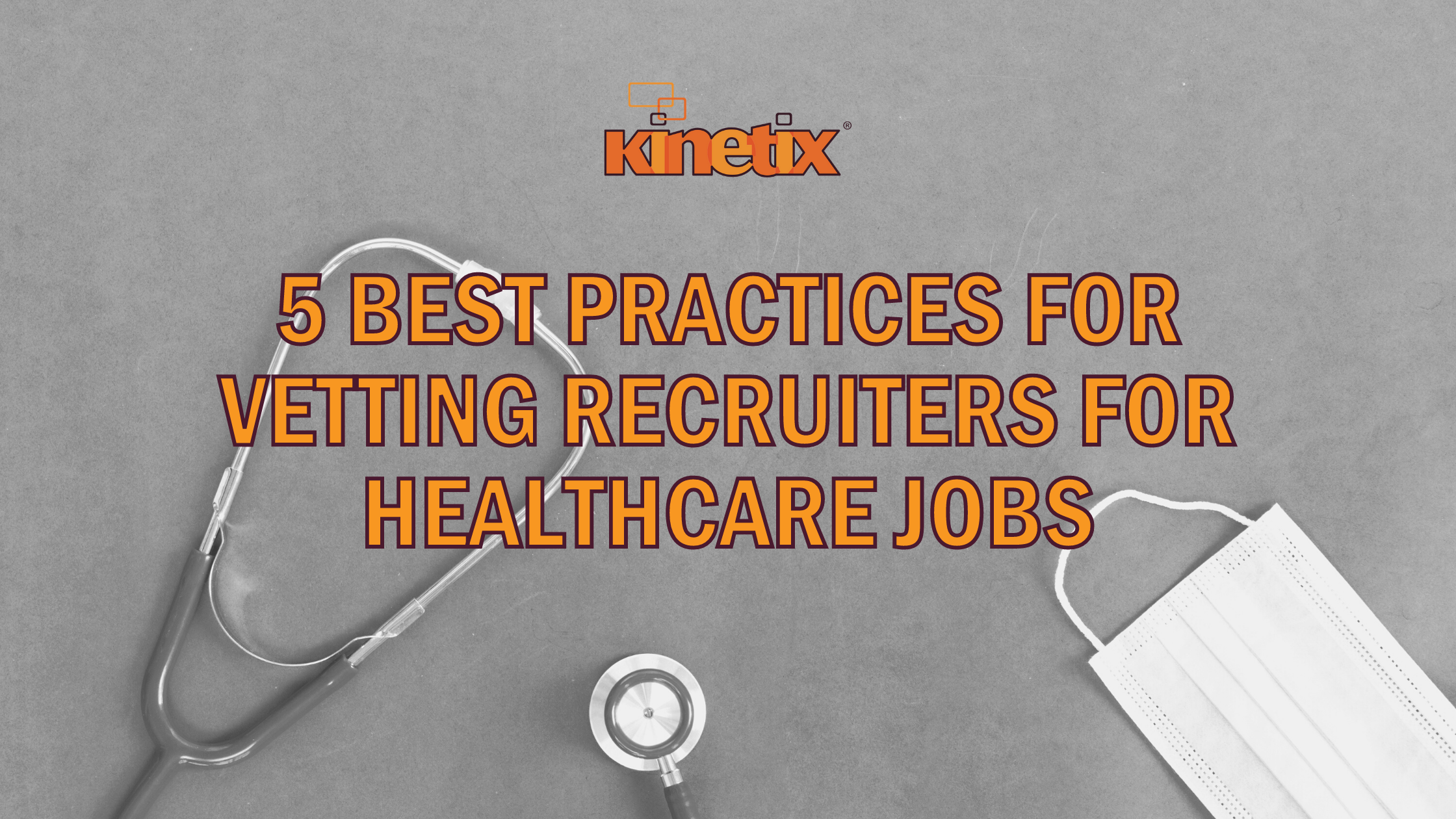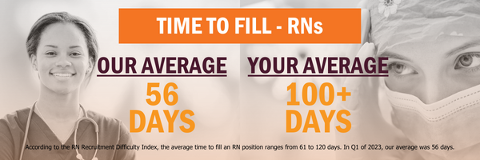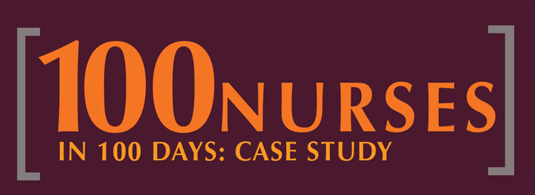
Table of Contents
- Prioritize Healthcare-Specific Experience
- Assess the Recruiter's Network
- Evaluate Their Understanding of Different Healthcare Roles
- Consider Their Success Rate & Business Reputation
- Review Their Approach to Candidate Screening
- Consider Healthcare RPO (Bonus Tip)
- Healthcare Recruitment Process Outsourcing
When it comes to healthcare, there's no room for compromise.
The same holds true when hiring for healthcare roles.
As a human resources professional or hiring manager, selecting the right recruiter is as crucial as choosing the right candidate.
Here at Kinetix, we understand that expertise matters, so we've compiled these tips to help you choose the right recruiter for healthcare jobs.
1. Prioritize Healthcare-Specific Experience
.png?width=1080&height=1080&name=August%20Social%20(7).png)
Healthcare roles are unique and varied, from clinical roles such as doctors, nurses, and therapists, to non-clinical roles like healthcare administrators, IT specialists, and finance experts.
Each role requires specific qualifications, skills, and understanding.
A recruiter with healthcare-specific experience will have a firm grasp of these requirements, speak the industry's language, and better communicate with and assess potential candidates.
Evaluating a Recruiter's Healthcare-Specific Experience

To assess a recruiter's healthcare-specific experience, consider the following:
- Specialization: Some recruiters might specialize in certain areas of healthcare, such as nursing, medical technology, or healthcare administration. Finding a recruiter with relevant discipline can be beneficial if hiring for specialized roles.
- Knowledge of Regulations and Requirements: Healthcare roles often have specific regulatory requirements and certifications. A healthcare-experienced recruiter will know these and ensure candidates meet all necessary qualifications.
- Network: An established network in the healthcare sector is a sign of a seasoned healthcare recruiter. This network can be a valuable resource for reaching active and passive candidates.
2. Assess the Recruiter's Network

In healthcare recruiting, connections can make all the difference. The more comprehensive and varied the network a recruiter maintains, the higher the chances they find the right match for your organization.
Why Networking Matters in Healthcare Recruitment
A robust network means the recruiter has direct access to a wide range of potential candidates.
This includes both active job seekers and passive candidates who might not be actively looking but could be interested if the right opportunity arises.
As talent shortages are a growing concern, having access to an extensive network can be invaluable.
Signs of a Well-Connected Recruiter
Look for signs like:
- Active participation in professional networks: Check if the recruiter maintains active profiles on professional networking sites like LinkedIn. Do they have a substantial number of connections, and more importantly, are they involved in discussions and groups relevant to healthcare?
- Presence in industry events: Participation in industry conferences, webinars, and other events is a good sign that the recruiter is proactive in staying connected and updated within the healthcare field.
- Strong relationships with healthcare facilities: Strong relationships with various healthcare facilities can provide an edge in understanding industry-specific needs and the latest trends in healthcare recruitment.
3. Evaluate Their Understanding of Different Healthcare Roles
The depth of a recruiter's knowledge about various healthcare roles impacts their ability to source and match the right candidates to suitable positions.
In-depth knowledge enables them to:
- Identify key skills and qualifications: A recruiter who understands healthcare roles can quickly identify the skills, certifications, and qualifications required for each position. This ensures they only shortlist candidates who meet these requirements.
- Understand job responsibilities: An intimate understanding of job responsibilities enables a recruiter to match the job role with the candidate's experience, skills, and career aspirations.
- Assess cultural fit: With a deep understanding of the role and your organization, a recruiter can assess whether a candidate will fit well into your company culture.
How to Assess Their Understanding
To evaluate a recruiter's understanding of various healthcare roles, consider the following:
- Ask for a role description: Request the recruiter to describe a few healthcare roles. Their ability to provide detailed, accurate descriptions can demonstrate their understanding of these roles.
- Ask about their experience in filling similar roles: Have they previously recruited for similar positions? What was their success rate? Can they provide any testimonials or references from these placements?
- Inquire about their strategy: How do they source candidates for specific roles? A recruiter with a solid understanding of healthcare roles will develop a concrete recruiting strategy tailored to your needs.
4. Consider Their Success Rate & Business Reputation
-Jan-20-2023-05-44-12-9376-PM.png?width=1080&height=1080&name=Jan%20Social%20Posts%20(Square)-Jan-20-2023-05-44-12-9376-PM.png)
A recruiter's reputation can provide insights into their professional ethics, reliability, and general effectiveness.
Meanwhile, their success rate gives you a data-backed measure of their capabilities in finding the appropriate candidates.
Combined, these two aspects provide a more holistic understanding of the recruiter's strengths and weaknesses.
Assessing Reputation
There are several ways to gauge a recruiter's reputation:
- Check client testimonials and reviews: Conduct a thorough online search of their business. Look for reviews on Google, list rankings, social media, and the recruiter's website.
- Seek industry recognition: Check if the recruiter has received any awards or recognitions from industry bodies. Relevant awards can signify a strong reputation within the professional community.
- Request references: Ask the recruiter for references from previous clients. Direct conversations can offer candid insights into their working style, reliability, and overall service quality.
Evaluating Success Rate
To understand a recruiter's success rate:
- Request for quantifiable data: Ask the recruiter for specific figures related to past placements. Metrics should include the number of successful placements, the level of roles filled, and the satisfaction rate of the companies they worked with.
- Understand their success metrics: Different recruiters may have different definitions of 'success'. Some may count a successful placement as a candidate staying in a role for a minimum period, while others may include client satisfaction in their metrics. Clarify what 'success' means to them before comparing numbers.
- Ask about their strategies: Successful placements often result from well-devised strategies. Have the recruiter walk you through the methods that have led to their most successful placements. This can give you a glimpse into their thought process, diligence, and adaptability.
5. Review Their Approach to Candidate Screening

A well-structured and rigorous screening process is pivotal in identifying the proper candidate for the job.
It helps filter out under-qualified or unfit candidates early in the hiring process, saving time and resources.
A detailed screening process assesses:
- Skills and qualifications: Ensuring the candidate has the necessary expertise and certifications to perform the job effectively.
- Experience: Evaluating the candidate's past roles and accomplishments to determine their suitability for the job.
- Cultural fit: Assessing if the candidate's values, work style, and aspirations align with the organization's culture.
- Background checks: Verifying the candidate's references, work history, and any necessary background checks, especially critical in the healthcare sector.
Evaluating a Recruiter's Screening Process
To assess a recruiter's approach to candidate screening:
- Ask about their process: Have the recruiter explain their screening process in detail. They should be able to outline their procedures for assessing skills, qualifications, experience, cultural fit, and performing background checks.
- Check for customization: A one-size-fits-all approach doesn't work in healthcare recruitment. The recruiter should be able to tailor the screening process to suit different roles and your organization's specific needs.
- Consider their tools and resources: Today's recruiters can leverage various tools and resources for candidate screening, including AI-powered software, behavioral assessments, and video interviews. Ask the recruiter about their tools and how they enhance the screening process.
6. Consider Healthcare RPO (Bonus Tip)
Healthcare Recruitment Process Outsourcing (RPO) is a service where an external provider (an RPO provider) takes on all or part of an organization's recruitment processes specifically for the healthcare sector.
The provider manages the end-to-end recruitment process, including understanding job requirements, sourcing candidates, screening, conducting interviews, and extending job offers.
Evaluating a Recruiter's Screening Process
|
Traditional Recruiting |
Healthcare RPO |
|
|
Scope of Service |
Fills individual vacancies. |
Manages end-to-end recruitment process. |
|
Partnership Model |
Acts as a third-party service provider. |
Operates as an extension of your HR department. |
|
Cost Structure |
Charges a fee per placement. |
Operates on a cost-per-hire or monthly fee basis. |
|
Scale and Flexibility |
Limited scalability based on the size of the recruiting agency. |
Can readily scale services up or down based on hiring needs. |
|
Technology and Innovation |
May use traditional recruitment methods. |
Leverages the latest recruitment technologies and data analytics. |
|
Strategic Role |
Focuses on filling open positions. |
Helps with employer branding, talent pool development, workforce planning, and other strategic initiatives. |
|
Industry Expertise |
General understanding of various industries. |
Deep understanding of healthcare industry, roles, regulations, and necessary skills and qualifications. |
Why Kinetix for Healthcare Recruitment Process Outsourcing
We're passionate about helping you attract, hire, and retain top healthcare talent. Our dedicated team of healthcare recruitment experts and innovative, tailored RPO solutions streamline hiring processes and deliver quality candidates who can make a difference in your organization.
Ready to transform your healthcare recruitment process? Contact Kinetix today. Your optimal healthcare workforce is just a click away.



